|
|
|
Sort Order |
|
|
|
Items / Page
|
|
|
|
|
|
|
| Srl | Item |
| 1 |
ID:
162308
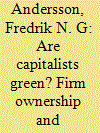

|
|
|
|
|
| Summary/Abstract |
In China, a large private sector has evolved alongside a still sizeable state-owned sector that is subject to government control. Several studies have found that in this mixed economy, the private sector is economically more efficient than the state-owned sector. In this paper, we investigate whether private firms are also more carbon efficient than state-owned firms. Using a macroeconomic panel data model with provincial data from 1992 to 2010, we confirm that private firms emit less carbon dioxide than state-owned firms. Our results imply that future reforms, such as ongoing privatization, introduced to increase the economic efficiency of state-owned companies will also mitigate emissions growth. The policy lesson, not only for China but for developing countries maintaining a large state-owned sector, is that economic efficiency and energy efficiency are conjoined mutual benefits.
|
|
|
|
|
|
|
|
|
|
|
|
|
|
|
|
| 2 |
ID:
098623


|
|
|
|
|
| Publication |
2010.
|
| Summary/Abstract |
A decade ago, electricity distribution network revenues per customer in New South Wales (NSW) were twice those in Great Britain (GB). Recent price controls imply that by 2014 they will be nearly four times as high. This paper examines possible reasons for this. The main reason does not seem to be geography, operating environment or industry structure. GB and Victoria have managed to accommodate increasing demand at broadly constant or even declining costs and revenues while delivering higher quality of service, while NSW has not. The regulatory framework and the practice of the regulatory body within that framework seem relevant. Australian regulators have not used benchmarking techniques as the GB regulator has. Perhaps the most important explanatory factor is private ownership in GB and Victoria compared to state ownership in NSW. This could also impact on the nature and effectiveness of regulation.
|
|
|
|
|
|
|
|
|
|
|
|
|
|
|
|
| 3 |
ID:
085894
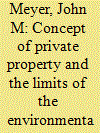

|
|
|
|
|
| Publication |
2009.
|
| Summary/Abstract |
An absolutist concept of property has the power to shape and constrain the public imagination. Libertarian theorists normatively embrace this concept. Yet its influence extends far beyond these proponents, shaping the views of an otherwise diverse array of theorists and activists. This limits the ability of environmentalists, among others, to respond coherently to challenges from property rights advocates in the U.S. I sketch an alternative concept-rooted in practice-that understands private property as necessarily embedded in social and ecological relations, rather than constrained by these relations. I argue that this concept can prefigure a more robust environmentalism.
|
|
|
|
|
|
|
|
|
|
|
|
|
|
|
|
| 4 |
ID:
123502


|
|
|
|
|
| Publication |
2013.
|
| Summary/Abstract |
The currently intense debate about 'land grabs' or 'land investment' in Africa has reinforced the significance of relations around land on the continent. This article argues that holders of land under customary tenure face increasing threat and that the role of foreign investors must not obscure the centrality of national agents - governments, political authorities and private actors - in land deals. The article first outlines the historical heritage of the colonial construction and post-colonial reproduction of customary tenure and its denial of full property to customary land-holders. The second part considers the escalating competition and conflict centered on land; the increase in land transfers implicated in the pervasive social conflict focused on land; and the associated rise in social inequality and contestation over belonging and citizenship. All these processes intensify the vulnerability of customarily held land in face of an escalation in efforts to acquire landed resources. The third and final part discusses 'land grabs', the most recent surge of international interest in African land, and the equally significant appropriation of land by national agents. The article concludes that the land question in contemporary Africa has to be linked to the dynamics of social transformation and inequality at multiple levels - global, regional, national, sub-national - that are reshaping not merely access to landed resources but the very bases of authority, livelihood, ownership and citizenship.
|
|
|
|
|
|
|
|
|
|
|
|
|
|
|
|
| 5 |
ID:
178842
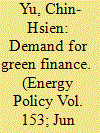

|
|
|
|
|
| Summary/Abstract |
This paper investigates the effects of financing constraints on prompting green innovations using a sample of Chinese listed firms in the period 2001–2017. Also, we explore how green finance policies resolve financing constraints of firms to green innovation. The capability of green innovation is found to be impaired when firms face higher financing constraints, and privately owned enterprises tend to be more vulnerable than state-owned ones in this regard. Although green finance policies can effectively ease financing restraints on green innovation overall, green credits are less likely to be available to privately owned enterprises. However, these enterprises which are deeply affected by financing constraints have relatively high innovation capabilities. We suggest the government to provide more supports to privately owned enterprises for investing in green projects. Further, both financial institutions and privately owned enterprises should be required to disclose more information on green credits and green projects, respectively. In addition, the China Banking Regulatory Commission should design a synthetic mechanism for evaluating green performance.
|
|
|
|
|
|
|
|
|
|
|
|
|
|
|
|
| 6 |
ID:
143431
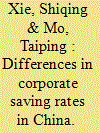

|
|
|
|
|
| Summary/Abstract |
Using the data of the listed non-financial companies from 2003 to 2012, this paper conducts a firm-level empirical analysis to reveal the determinants that lead to differences in saving rates of different enterprises in China. Particularly, we explore the discrepancies in the Chinese enterprises' saving rates from the new perspectives of ownership type, monopoly status, and financial development. We find that only some financial indicators of a firm, including the size and the long-term solvency ability, have direct impact on its saving rate. Besides, the difference in the saving rates between private firms and state-owned firms is insignificant while monopolies have higher saving rates than non-monopolies. Most importantly, financial development generally reduces a firm's saving rate and the impact is independent on its ownership type and monopoly status. Moreover, financial development decreases the influence of a firm's short-term solvency and profitability on its saving rate.
|
|
|
|
|
|
|
|
|
|
|
|
|
|
|
|
| 7 |
ID:
166709
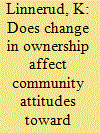

|
|
|
|
|
| Summary/Abstract |
The distributed nature of many renewable energy technologies allows for new ownership models as well as frequent ownership changes. We analyse whether a change in ownership negatively affects community attitudes toward a hypothetical small-scale hydropower plant. We use a two-stage framing experiment and a student sample. We find that a change in ownership has a significant negative effect on their attitudes toward the project, irrespective of whether the change is from a national to a local owner or vice versa. We interpret this finding as an example of a status quo bias, that is, a preference for the current state of affairs. A status quo bias makes renewable energy transitions more challenging, at least initially. Over time, as the status quo shifts, this may become less of an issue. We conclude the paper by discussing the robustness of our findings as well as whether and how policymakers can reduce the impact of such cognitive biases.
|
|
|
|
|
|
|
|
|
|
|
|
|
|
|
|
| 8 |
ID:
152796


|
|
|
|
|
| Summary/Abstract |
In international development, shared ownership is assumed to be a condition for effectiveness. Academic studies question this relation, claiming shared ownership can instead lead to ineffectiveness. This study analysed the interplay between ownership and effectiveness in a transnational advocacy network for conflict prevention observed 2012–2015. Building on recent discussions about balancing unity and diversity in networks, this article unpacks the ownership/effectiveness relationship into three dimensions: collective identity, accountability processes and a shared advocacy message. We find that the question is not about more or less effectiveness, but about the processes shaping the meaning of effectiveness in particular institutional constellations.
|
|
|
|
|
|
|
|
|
|
|
|
|
|
|
|
| 9 |
ID:
159055
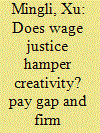

|
|
|
|
|
| Summary/Abstract |
Although the pay gap between executives and employees has received considerable attention, its economic consequences remain unclear due to the unavailability of data. In this study, we examine the effects of the pay gap on firm innovation by using data from Chinese listed firms. We show that: 1) the first-order effect of pay gap on firm innovation is significantly positive, supporting the tournament theory; 2) however, when pay gap is relatively high, the importance of comparison theories increases; 3) high management pay premiums provide incentives for management to devote to innovation activities, while pay premiums for ordinary employees impede firm innovation; and 4) both the employee's human capital and state ownership play significant roles in the negative effects of employee pay premiums on firm innovation. Overall, we provide critical insights and a serious challenge for regulators in China. The policy implications of this study could be of interest to regulators who intend to encourage firm innovation.
|
|
|
|
|
|
|
|
|
|
|
|
|
|
|
|
| 10 |
ID:
157983


|
|
|
|
|
| Summary/Abstract |
The European Union Police Mission for the Palestinian Territories (EUPOL COPPS) was established in 2006 to contribute to the establishment of effective policing in support of an independent and democratic Palestinian state. EUPOL COPPS is often commended for its contribution to the professionalization of the Palestinian security sector under local ownership. Drawing on 40 interviews, we argue that the mission can be considered effective and locally owned only from a narrow technocratic perspective, which denies the political reality of continued occupation and absence of democracy. A broader analysis, which includes the voices of ordinary Palestinians, reveals that EUPOL COPPS contributed to the professionalization of authoritarian policing under continued Israeli occupation. Our findings show the limits of technocratic approaches to peacebuilding interventions and call for a stronger engagement with the ultimate beneficiaries of peacebuilding missions.
|
|
|
|
|
|
|
|
|
|
|
|
|
|
|
|
| 11 |
ID:
110239
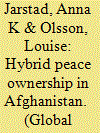

|
|
|
|
|
| Publication |
2012.
|
| Summary/Abstract |
What does local ownership actually entail in the context of an international peace operation supporting sustainable development and stability? Who should own what? Moreover, when should local ownership be introduced? Using the case of Afghanistan as a fruitful example, this article suggests that ownership is key for understanding the interactions between international and local actors as it highlights the asymmetry of this power relation. In all three types of roles that the international actors can perform-intervenor, mentor, or facilitator-such an asymmetric power relation exists. For Afghanistan, the result of the different approaches to local ownership has been a complex form of hybrid peace ownership where the international actors have become intertwined in almost all aspects of Afghan life. As the international actors are decreasing their involvement by moving from the role of intervenor to the role of mentor, the sustainability of development and stability in Afghanistan will undoubtedly be put to the test.
|
|
|
|
|
|
|
|
|
|
|
|
|
|
|
|
| 12 |
ID:
150766
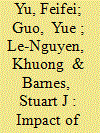

|
|
|
|
|
| Summary/Abstract |
In this research, we aim to understand the influence of government subsidies on enterprises’ research and development (R&D) investment behavior, particularly in China’s renewable energy sector. We are also interested in examining how the attributes of enterprise ownership act as a moderating variable for the relationship between government subsidies and R&D investment behavior. Three classical panel data analysis models including the pooled ordinary least squares (OLS) model, the fixed effect model and the random effect model are employed. We find that government subsidies have a significant crowding out influence on enterprises’ R&D investment behavior and that the influence is further moderated by the attributes of enterprise ownership. Moreover, a panel threshold regression model is used to demonstrate how the influence of government subsidies on enterprises’ R&D investment behavior will change when government subsidies increase. Two thresholds, 0.6% and 10.1%, are identified. We recommend that relevant government departments should motivate enterprise R&D investment behavioral intention by increasing subsidies within a certain range. Different attributes of enterprise ownership should also be considered as part of policy reform and re-structuring relating to government subsidies.
|
|
|
|
|
|
|
|
|
|
|
|
|
|
|
|
| 13 |
ID:
177037
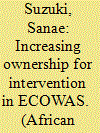

|
|
|
|
|
| Summary/Abstract |
After the Cold War, not only the United Nations (UN) but also regional organisations began to engage in the internal conflicts of their member states. The Economic Community of West African States (ECOWAS) has long intervened in West African conflicts, and institutionalised its approach to interventions in 1999. Since then, member states have maintained and even increased their commitment to managing conflicts in West Africa regionally – a willingness that implies their ownership of interventions. This article argues that ECOWAS member states share ownership because they have developed a common understanding about intervention. The development of this common understanding is analysed with a focus on the origin and evolution of ECOWAS, that is, on the multi-level process of generating consensus and on the principle and practice of sharing the costs of resource mobilisation. I will show that, in practice, these processes led each state to perceive an enhanced sense of ownership in ECOWAS interventions. Case studies of ECOWAS interventions in Liberia, Sierra Leone, Guinea-Bissau and Cote d’Ivoire in the 1990s and the 2000s, the period when the organisation’s interventions became institutionalised, support the argument.
|
|
|
|
|
|
|
|
|
|
|
|
|
|
|
|
| 14 |
ID:
147426
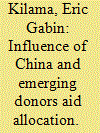

|
|
|
|
|
| Summary/Abstract |
From the perspective of recipients, the increasing influence of China and emerging donors in the aid landscape represents an opportunity to attract additional resources to finance development and improve their control over their development agenda. This paper investigates how African countries and other LMICs deal with this complex and changing aid landscape and explores how government fiscal behaviors and private agent anticipations regarding aid flows are affected.
We used several measures of fiscal behaviors and we were not able to confirm empirically the fear of traditional donors about a macroeconomic disaster that would follow emerging donors aid allocation. Moreover, the results indicate that economies receiving additional aid flows from China enhance their fiscal response to aid through an increased domestic economy aid absorption rate.
|
|
|
|
|
|
|
|
|
|
|
|
|
|
|
|
| 15 |
ID:
108001
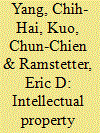

|
|
|
|
|
| Publication |
2011.
|
| Summary/Abstract |
This paper aims to systematically investigate the impacts of strengthening intellectual property rights on patenting in China's high-technology industries and to explore the potential differences in response to patent reform by ownership. Empirical results show that the estimated patent elasticity of R&D is lower than that for OECD countries, indicating relatively low R&D productivity for China's high-technology industries. The direct innovation effect of technology imports is negative, while the absorptive ability embodied in R&D helps in gaining external sources of knowledge, thus contributing to innovations. Specifically, strengthening intellectual property rights can induce more innovations in terms of patents in China's high-technology industries and is particularly relevant to foreign-owned high-technology enterprises.
|
|
|
|
|
|
|
|
|
|
|
|
|
|
|
|
| 16 |
ID:
157984
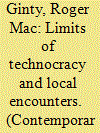

|
|
|
|
|
| Summary/Abstract |
This article is the conclusion to a special issue that examines the European Union (EU), peacebuilding, and “the local.” It argues that technocracy—particularly EU technocracy—shapes the extent to which local actors can hope to achieve ownership of externally funded and directed peace support projects and programs. Although some actors within the EU have worked hard to push localization agendas, a number of technocracy linked factors come together to limit the extent to which the EU can truly connect with the local level in its peace support activities. While the EU and other international actors have invested heavily into capacity building in conflict-affected contexts, the EU’s own capacity has not necessarily been built to address the scalar problem of accessing the local in ways that are meaningful.
|
|
|
|
|
|
|
|
|
|
|
|
|
|
|
|
| 17 |
ID:
153142


|
|
|
|
|
| Summary/Abstract |
A paradox in current international development cooperation is comprised by the simultaneous insistence on national ownership and far-reaching donor involvement through policy dialogue. In order to better understand this combination of a strong ownership ideal and extensive donor presence, this article explores how national and external actors portray the process of formulating and revising development policies and programmes in an aid recipient country. The study is based on original empirical material from national as well as external actors involved in the aid relation in Rwanda which, despite heavy aid dependence, is known to have achieved relative policy independence. Analysed in relation to three strands of critical thought in previous research, findings show that, in Rwanda, the very top political leadership is actively involved in initiating and formulating policies; that there are instances of negotiation as well as strong disagreements between national and external actors; and that, rather than donors seeking to retain control, Rwanda is depicted as setting its own agenda and effectively managing its donors. The paradox of an ownership ideal combined with donor involvement is thus met by an apparent tendency among national as well as external actors to emphasise national ownership while toning down donor influence.
|
|
|
|
|
|
|
|
|
|
|
|
|
|
|
|
| 18 |
ID:
139235


|
|
|
|
|
| Summary/Abstract |
Far reaching decentralisation reform has been launched in Rwanda, intended to contribute to socioeconomic development as well as to reconstruction and reconciliation. While the reform is well in line with the international trend of a ‘local turn’, the Rwandan government makes a point of not letting donors or other external actors set the agenda. Determined to formulate its own policies, thus claiming ‘national ownership’, it has, within the frame of decentralisation, launched several development programmes to be locally implemented and to promote local participation and downward accountability. However, the reform and programmes are designed and decided upon in a top-down manner by the central national leadership. This article analyses local experiences and perceptions of decentralisation and related programmes, and investigates whether and how such reform provides for local participation and downward accountability. It concludes that nationally owned reform is not necessarily an alternative to externally initiated and driven reform; neither local participation nor downward accountability was enhanced. The study builds on official policy documents and semi-structured interviews with Rwandan residents and local officials.
|
|
|
|
|
|
|
|
|
|
|
|
|
|
|
|
| 19 |
ID:
168662


|
|
|
|
|
| Summary/Abstract |
Extractive resources politics in many resource rich countries remain contentious due to complex relations between resource owners on the one hand and the investors on the other hand. Recent policy reforms in Tanzania have been enacted to bring the development of energy resources under the control of the national government. The impact of these policy changes on the politics of participatory resource governance in terms of local community engagement in decision making and governance processes has not received much scholarly attention. This paper explores how the government's policy of national ownership shapes community engagement in decision making processes in the gas rich regions of Mtwara and Lindi. The paper draws on government documents, media reports as well as interviews with local communities, local government leaders and officials and central government officials. It argues that the policy framework for national ownership of natural gas is used by the government to thwart grassroot community initiatives for participation in decision making processes.
|
|
|
|
|
|
|
|
|
|
|
|
|
|
|
|
| 20 |
ID:
099814


|
|
|
|
|
| Publication |
2010.
|
| Summary/Abstract |
This article presents a new analytical approach to the study of aid negotiations. Building on existing approaches but trying to overcome their limitations, it argues that factors outside of individual negotiations (or the `game' in game-theoretic approaches) significantly affect the preferences of actors, the negotiating strategies they fashion, and the success of those strategies. This approach was employed to examine and compare the experiences of eight countries: Botswana, Ethiopia, Ghana, Mali, Mozambique, Rwanda, Tanzania and Zambia. The article presents findings from these country studies which investigated the strategies these states have adopted in talks with aid donors, the sources of leverage they have been able to bring to bear in negotiations, and the differing degrees of control that they have been able to exercise over the policies agreed in negotiations and those implemented after agreements have been signed. It argues that Botswana, Ethiopia and Rwanda have been more successful than the other five cases in levering negotiating capital from the economic, political, ideological and institutional conditions under which negotiations occur.
|
|
|
|
|
|
|
|
|
|
|
|
|
|
|
|
|
|
|
|
|